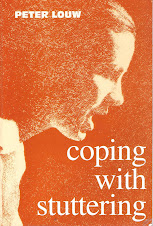My first therapy was in high school. It mostly consisted of reading in front of the therapist and walking around the campus (the clinic was linked to a university) with her - I had to ask people the time while stuttering artificially. This went on for a few months, and though I hated the therapy my speech improved and I was quite fluent for about 6 months.
In retrospect I now understand why I experienced this temporary fluency after therapy. The therapy had the effect of reducing my stress - therapy tends to do that because of all the attention given to your speech. The therapy reduced my base-level tension to below my stuttering threshold - to the point where my conditioned stuttering reflexes could not be activated. So at the end of the therapy the therapist, a rather pretty young woman, discharged me as "cured". That was in the 60s, when there was little understanding of stress and how it works. Eventually, of course, my stutter returned as my base-level tension returned to its pre-therapy levels - quite understandable, as all the usual stressors of life still remained.
While at university I made a second attempt at improving my speech. At the time I was convinced that the problem was psychological, and I consulted a psychiatrist who supposedly had a good reputation in the treatment of stuttering. His treatment included hypnosis and self-hypnosis, which was to an extent beneficial. He taught me how to relax. I had to do self-hypnotic relaxation exercises for an hour every day... though these helped, the enormous effort which I invested in these exercises was not reflected in the results. I had to learn the hard way that stress control in itself is usually inadequate in stuttering management, even though it can be a valuable supplementary aid.
In the 80s I attended a Passive Airflow Technique intensive group workshop of Dr Martin F. Schwartz, and did the follow-up programmes. I also started attending the self-help support group which was created as part of the workshop. These experiences were turning points in my life. Daily practising resulted in big improvements - unfortunately also followed by immense relapses as the "subconscious stutterer within" tried to reassert itself in response to my newfound fluency, and played havoc with my stress levels. Change can be very stressful. In the course of time, however, my subconscious got used to my improved speech. This process was much helped by the self-improvement books which I devoured at the time. Resulting from all my experiences I eventually wrote my own book on stuttering, and this lead to some media exposure - I even appeared on TV and radio, which went quite well.
To make a long story short: I have made huge improvements during the past 30 years. I am certainly not 100% fluent - chronic stuttering is seldomly cured - but can now manage my most pressing speaking situations. The phone is no longer a major problem; through stress-desensitisation steps I gradually overcame many telephone fears and other telephone-induced stresses. I must admit that I still have some public speaking fears, but this is quite common also in fluent people.
Even so I would not want to jump on the "success story" bandwagon. Though my life has become much easier thanks to stuttering management, I sometimes feel that I spent too much time and energy on it which could have been used for other purposes. But that's life - it takes you in unexpected directions.
Subscribe to:
Post Comments (Atom)






Chata
ReplyDeleteThanks for posting. It is interesting, eventhough some argue with passive airflow tehnique. I also started stuttering web portal in Bosnia, feel free to come by. You have my support for this blog.
best regards
Many thanks, Chata, I will certainly visit your website. Good luck and kind regards! Peter
ReplyDelete